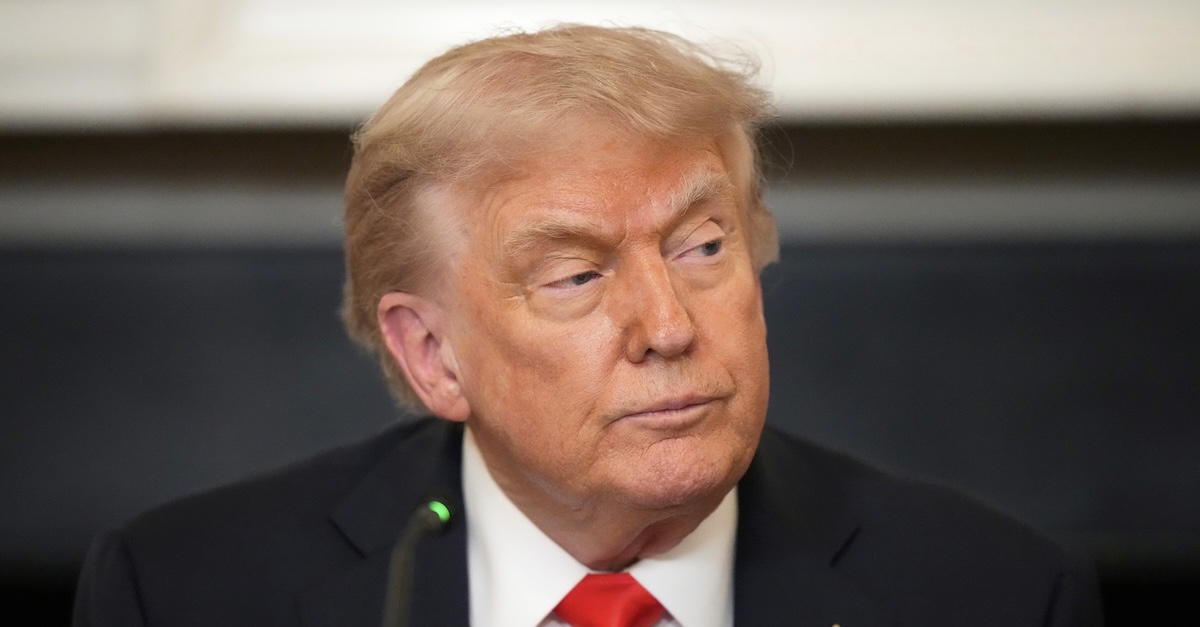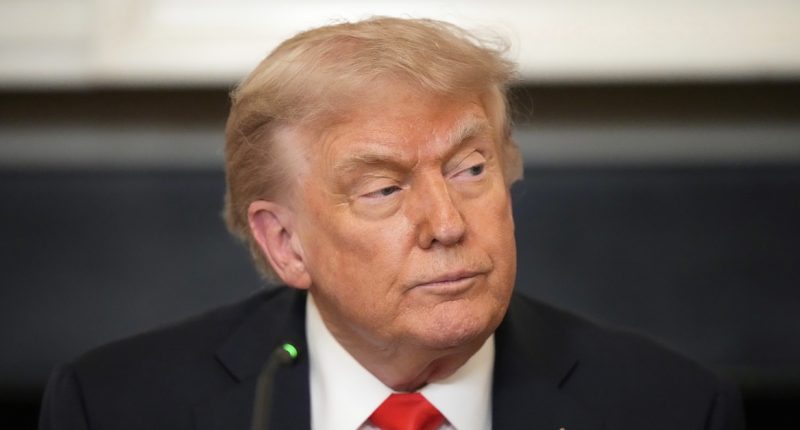
President Donald Trump attends a meeting with the Fraternal Order of Police in the State Dinning Room of the White House, Thursday, June 5, 2025, in Washington (AP Photo/Alex Brandon).
A federal appellate court on Friday upheld a lower court order directing the Trump administration to restore National Institutes of Health (NIH) research grants cut in response to executive orders.
In a unanimous order, the U.S. Court of Appeals for the First Circuit rejected a request to stay the nullification order issued by U.S. District Judge William Young, a Ronald Reagan appointee, late last month.
While the government waited to fully appeal until the lower court issued a final order earlier in July, the intermediary court made sure not to fault this slightly-delayed motions practice in its ruling.
“This matter is before the court on defendants-appellants” ‘Time Sensitive Motion for Stay Pending Appeal and Immediate Administrative Stay,'” the panel explains. “The request for immediate relief is DENIED. We note, though, that defendants-appellants filed their motion the day after the district court had entered a promised memorandum reflecting its legal reasoning, and our denial of immediate relief therefore is not based on the timing of relevant filings.”
Love true crime? Sign up for our newsletter, The Law&Crime Docket, to get the latest real-life crime stories delivered right to your inbox.
Earlier this year, President Donald Trump took aim at the NIH grants in question by way of executive orders attacking diversity, equity and inclusion (DEI) programs and so-called “gender ideology.”
The lower court showcased its disdain for both executive orders – and ultimately previewed its two vacatur orders – during a harsh judicial dressing-down in mid-June.
“I am hesitant to draw this conclusion — but I have an unflinching obligation to draw it — that this represents racial discrimination and discrimination against America’s LGBTQ community,” Young said during the bench trial in the case. “That’s what this is. I would be blind not to call it out. My duty is to call it out.”
In each successive order, the court called the government out further.
The order issued June 23 contained merely conclusions but generally, and in all caps, found the NIH rescissions to be: “OF NO EFFECT, VOID, ILLEGAL, SET ASIDE AND VACATED.”
The court elaborated in its order issued July 2:
These consolidated actions are two of many in this district, and across the Nation, claiming that current Executive Branch policies, mostly through Executive Orders, have been implemented by various agencies in violation of the Administrative Procedure Act, statutory law, and the Constitution. Based upon the evidence presented at the hearing on the APA claims and bench trial of the remainder, this Court concludes what has been occurring at the Department of Health and Human Services (“HHS”) and the National Institutes of Health (“NIH”) with respect to its disruption of grants, the grant making process and the pipeline of future scientists by forbidding by fiat certain topics, is on this Administrative Record, illegal under the Administrative Procedure Act (“APA”).
“The new Administration began weaponizing what should not be weaponized – the health of all Americans through its abuse of HHS and the NIH systems, creating chaos and promoting an unreasonable and unreasoned agenda of blacklisting certain topics, that on this Administrative Record, has absolutely nothing to do with the promotion of science or research,” Young goes on.
The Trump administration complained largely about jurisdiction on appeal.
“This judgment was in error, most basically because this case should have been consigned to the Court of Federal Claims,” Assistant Attorney General Brett Shumate argued in the government’s July 3, filing with the appellate court.
In essence, the government sees the dispute as contractual in nature. If true, this means the litigation is governed by the obscure Tucker Act of 1887. Under this law, the U.S. Court of Federal Claims has jurisdiction to rule on “any claim” against the federal government that relies “upon any express or implied contract with the United States.”
The appeals court, in their Friday ruling, did not broach this claim – but is likely to do so when it later takes up the merits of the case.
“In any event, the court intends to rule on the broader request for stay relief as soon as practicable once the motion has been briefed,” the First Circuit’s denial of the administrative stay reads. “Plaintiffs-appellees should respond to the stay motion by 5:00 p.m. on Tuesday, July 8, 2025. Any reply should be filed by 5:00 p.m. on Wednesday, July 9, 2025. The court then will address the stay request as soon as practicable.”









